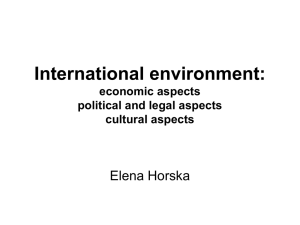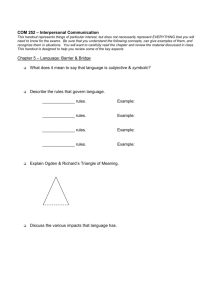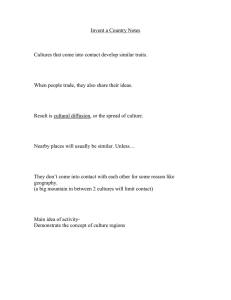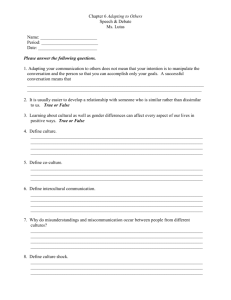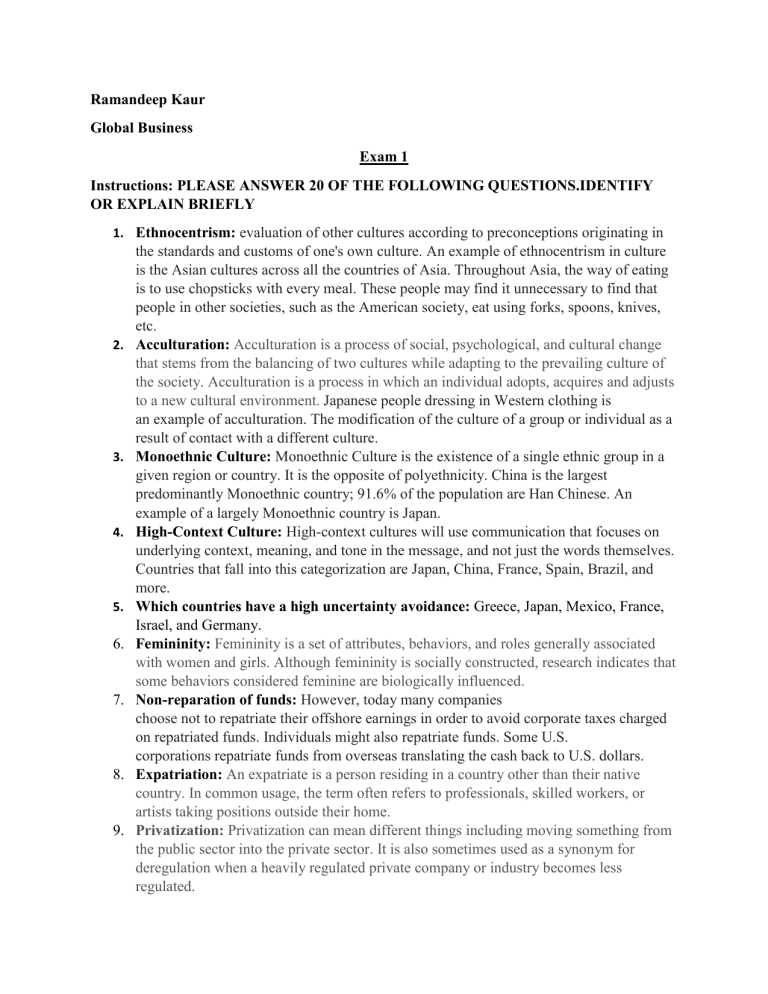
Ramandeep Kaur Global Business Exam 1 Instructions: PLEASE ANSWER 20 OF THE FOLLOWING QUESTIONS.IDENTIFY OR EXPLAIN BRIEFLY 1. Ethnocentrism: evaluation of other cultures according to preconceptions originating in 2. 3. 4. 5. 6. 7. 8. 9. the standards and customs of one's own culture. An example of ethnocentrism in culture is the Asian cultures across all the countries of Asia. Throughout Asia, the way of eating is to use chopsticks with every meal. These people may find it unnecessary to find that people in other societies, such as the American society, eat using forks, spoons, knives, etc. Acculturation: Acculturation is a process of social, psychological, and cultural change that stems from the balancing of two cultures while adapting to the prevailing culture of the society. Acculturation is a process in which an individual adopts, acquires and adjusts to a new cultural environment. Japanese people dressing in Western clothing is an example of acculturation. The modification of the culture of a group or individual as a result of contact with a different culture. Monoethnic Culture: Monoethnic Culture is the existence of a single ethnic group in a given region or country. It is the opposite of polyethnicity. China is the largest predominantly Monoethnic country; 91.6% of the population are Han Chinese. An example of a largely Monoethnic country is Japan. High-Context Culture: High-context cultures will use communication that focuses on underlying context, meaning, and tone in the message, and not just the words themselves. Countries that fall into this categorization are Japan, China, France, Spain, Brazil, and more. Which countries have a high uncertainty avoidance: Greece, Japan, Mexico, France, Israel, and Germany. Femininity: Femininity is a set of attributes, behaviors, and roles generally associated with women and girls. Although femininity is socially constructed, research indicates that some behaviors considered feminine are biologically influenced. Non-reparation of funds: However, today many companies choose not to repatriate their offshore earnings in order to avoid corporate taxes charged on repatriated funds. Individuals might also repatriate funds. Some U.S. corporations repatriate funds from overseas translating the cash back to U.S. dollars. Expatriation: An expatriate is a person residing in a country other than their native country. In common usage, the term often refers to professionals, skilled workers, or artists taking positions outside their home. Privatization: Privatization can mean different things including moving something from the public sector into the private sector. It is also sometimes used as a synonym for deregulation when a heavily regulated private company or industry becomes less regulated. 10. Nationalization: Nationalization is the process of transforming privately owned assets into public assets by bringing them under the public ownership of a national government or state. Nationalization usually refers to private assets or to assets owned by lower levels of government being transferred to the state. 11. Domestication: Domestication is a sustained multi-generational relationship in which one group of organisms assumes a significant degree of influence over the reproduction and care of another group to secure a more predictable supply of resources from that second group. 12. Extraterritoriality: In international law, extraterritoriality is the state of being exempted from the jurisdiction of local law, usually as the result of diplomatic negotiations. Historically, this primarily applied to individuals, as jurisdiction was usually claimed on peoples rather than on lands. 13. Helms-Burton Act: The Cuban Liberty and Democratic Solidarity Act of 1996, is a United States federal law which strengthens and continues the United States embargo against Cuba. 14. Webb-Pomerene: The Webb-Pomerene Export Trade Act of 1918 was intended to benefit U.S. exporters by allowing companies to form export trade associations, with qualified exemption from antitrust litigation, to effectively compete in world markets and thereby to enhance the U.S. position in international trade. 15. FCPA: The Foreign Corrupt Practices Act of 1977 is a United States federal law that prohibits U.S. citizens and entities from bribing foreign government officials to benefit their business interests. 16. VAT: A value-added tax, known in some countries as a goods and services tax, is a type of tax that is assessed incrementally. It is levied on the price of a product or service at each stage of production, distribution, or sale to the end consumer. 17. Command Economy: A command economy is a type of economic system where investment, production and the allocation of capital goods takes place according to economy-wide economic plans and production plans. A command economy may use centralized, decentralized, participatory or Soviet-type forms of economic planning. 18. Product Liability: Product liability is the area of law in which manufacturers, distributors, suppliers, retailers, and others who make products available to the public are held responsible for the injuries those products cause. 19. Code Law: A code of law, also called a law code or legal code, is a type of legislation that purports to exhaustively cover a complete system of laws or a particular area of law as it existed at the time the code was enacted, by a process of codification. 20. Coalition: an alliance for combined action, especially a temporary alliance of political parties forming a government or of states.
